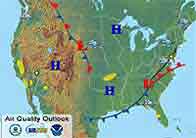Tips to make environmentally protective choices
Environmental responsibility is everyone’s responsibility. Today, instead of having only 17 thousand EPA employees working to protect the environment, we now have over 300 million Americans as environmental partners making environmentally protective choices. By equipping this growing army of environmental stewards with the tools they need to meet today’s challenges, EPA is helping America shift into a green culture.
Environmentally Protective Choices
Protect yourself from sun overexposure! In summer, always apply sun block SPF 15 or more to protect your skin from solar UV radiation. Just five or more sunburns can really increase your risk of developing skin cancer. The sun's rays are strongest between 10 a.m. and 4 p.m. so at the times, seek shade or wear protective clothing such as a long-sleeved shirt. Sign up to get free UV alerts.
 Check your air quality forecast to learn about any associated health that effects might be a concern for you. Read more
Check your air quality forecast to learn about any associated health that effects might be a concern for you. Read more Heading to the beach? Check out the beach water before you go! We Americans take almost two billion trips to the beach every year, but people who swim at the beach sometimes get sick because the water is polluted. The good news is in the state where the beach is located, you can check with the state office to find out about the beach water - before you go. Beach water quality where you live.
Be extra aware of environmental conditions where older people live! As we age, our bodies become more sensitive to chemicals and environmental conditions. So you should carefully use products such as pesticides or cleaning solvents near areas where older adults live and sleep. Always follow the directions on the product package or label. Reduce exposure for older people.
Read the label! You might not realize it, but on a pesticide container, the label is the law. Pesticide product labels provide critical safety information for handling and use. Pesticides are powerful substances, but when used according to the label they are safe and effective. So … always use pesticides safely, at home or in the field. Always read the label. Read the label first!
Exercising outdoors? Regular exercise makes us feel great and keeps us healthy. Before you head out for your workout or run, check the air quality forecast for your local area. You can find out when air pollutants such as ground-level ozone or airborne particles are at acceptable levels where you live. Check your air quality.
Don't let pet waste run off! You can help reduce polluted storm water runoff by just picking up your pet's poop and dispose of it properly. Leaving pet waste on the ground increases public health risks by allowing harmful bacteria or organic material to wash into the storm drain and eventually into local waterbodies. So remember - always scoop the poop! More on storm water runoff.
Pollute less with clean diesel! Encourage your hometown or state to spend road construction funds on newer, clean diesel equipment to help cut air pollution. Contractors, owners, and operators of diesel equipment can retrofit existing diesel engines with new technologies that pollute less, as well as replace old equipment. "Clean diesel" equipment.
Compliance made easy! Compliance Assistance Centers help businesses and local governments save on materials and help you understand and meet your environmental requirements. Compliance Assistance can help you through plain-language materials, Web sites designed for specific industry types or operations, telephone "ask the expert" help lines, and more. Business compliance assistance.
During hot weather, don't top off your gas tank. Refuel your car or truck in the early morning or the evening when it's cooler. A small fuel spill may not seem like much, but every spill evaporates and adds to air pollution, and fuel pumps with vapor recovery systems can feed a spill back into their tanks - after you paid for it. So, in hot weather - don't top off! Don't top off!
Breathe easy! On unhealthy air pollution "action alert" days, wait to mow your lawn until it's cooler in the evening or early the next morning. You help reduce air pollution for everyone near you if you run gas-powered equipment, like lawn mowers, when it's cooler. You also protect your health by avoiding ground-level ozone during the warmest part of the day. Check your air quality now.
Get the lead out! If you're doing work on an older home or school building, be sure to follow lead-safe work practices. Contain the work area and keep kids and pets away. Minimize dust. And clean up thoroughly. Lead is harmful to adults and children, and common renovation jobs like sanding, cutting, or demolition can create lead dust and chips. More on renovating.
Be green from the ground up! Test your home for radon. Radon is a naturally occuring, odorless gas that can seep out of the ground into your home. But as the second leading cause of lung cancer, radon is responsible for over 20,000 deaths a year. Fortunately, a home radon test is easy to do, and homes with high radon levels can be fixed. Get a radon test
Play it safe! Children are curious but they are also more sensitive to substances in the environment. Protect children from accidental poisoning by locking up your household cleaners, pesticides, paint thinners, and other substances. Household products are safe and effective when used properly. Remember to read the label. More ways to prevent poisoning.